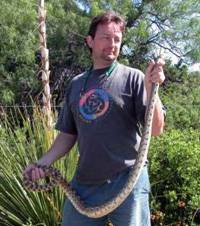Michael Forstner named first Chair of Genetics at Texas State
Posted by Jayme Blaschke
University News Service
December 5, 2007
 Michael Forstner |
Forstner will hold the endowed biology chair for a six-year term.
“Dr. Mary Alexander was a genetics professor in biology here, and way back when, she taught an undergraduate zoology major by the name of Mike Forstner,” Forstner explained. “I held out a long time to take her genetics course, because it was my biggest interest other than chasing snakes.
“Dr. Alexander left an endowment to the university to establish this chair,” he said. “It was her desire to help ensure that genetics research would prosper in this department in the future. She invested in that future.”
Forstner’s areas of research include vertebrate systematics and population genetics. The majority of his projects comprise genetic and physical surveys of endangered or threatened species, including ongoing work with the endangered Houston Toad.
Forstner came to
About the Alexander/Stone Chair of Genetics
The Alexander/Stone Endowed Chair of Genetics is named for Mary Louise Alexander (1926-1994) and William Stuart Stone (1907-1968).
Alexander earned her Ph.D. studying mutagenesis in Drosophila under the supervision of Stone. She continued her research at
Stone’s major field of study was radiation genetics. He served as a consultant for the Atomic Energy Commission, the National Institutes of Health, the Argonne National Laboratory, and the National Research Council, among others. He was elected to the National Academy of Sciences in 1960 and concluded his career as a vice chancellor in the